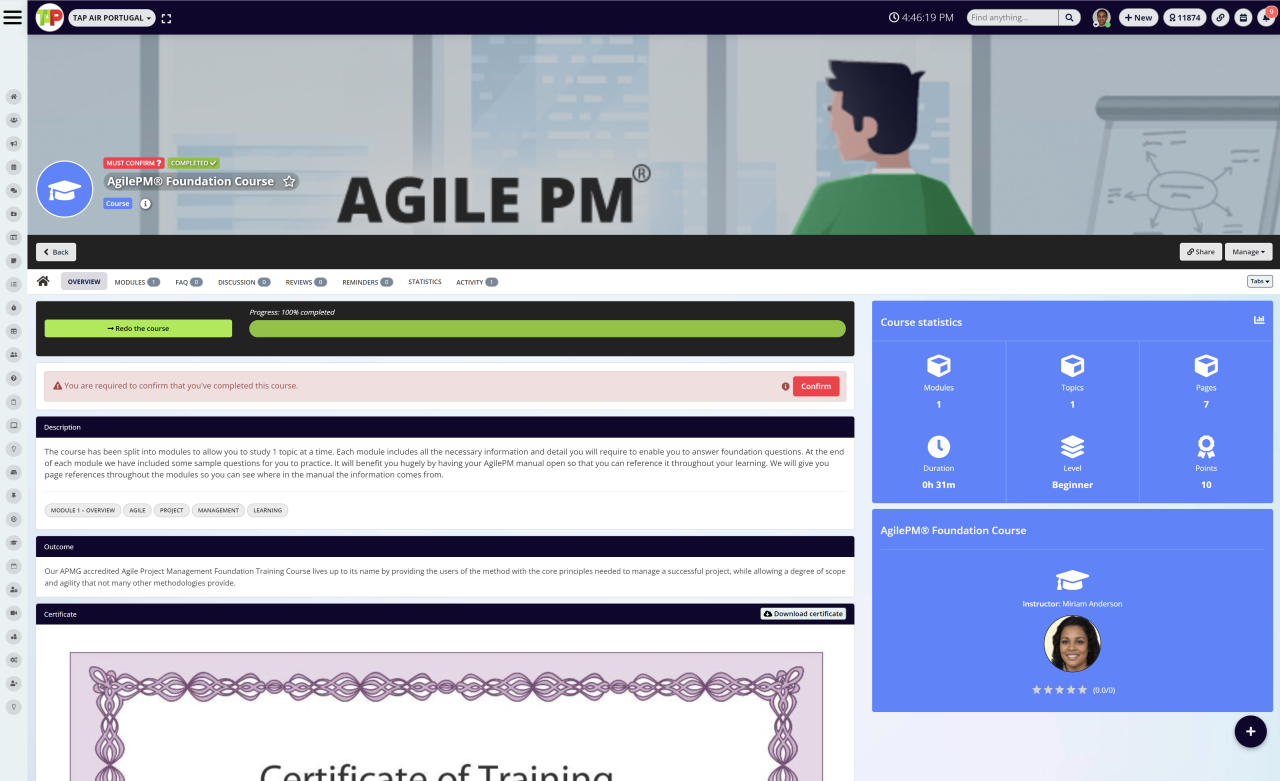Insight Blog
Agility’s perspectives on transforming the employee's experience throughout remote transformation using connected enterprise tools.
6 minutes reading time
(1201 words)
Bridging Accessibility Gaps: Advanced Level Online Courses
Learn about how online courses strategically bridge learning gaps. Explore tailored ways, and flexible delivery methods for effective knowledge transfer.
In our digital age, advanced online courses are transforming the educational landscape, going beyond the traditional boundaries of physical institutions and venturing into the vast realm of cyberspace. This shift isn't just about changing how we deliver education; it signifies a fundamental change in our approach to teaching and learning.
These cutting-edge courses lead a new trend, promoting a learning environment that values inclusivity and accessibility. By harnessing the capabilities of technology, they address the changing needs of a diverse learning community that has often been overlooked or underserved by traditional education systems. In the digital era, educational platforms dismantle geographical and socio-economic barriers, making high-quality education accessible to individuals from various backgrounds.
So, these courses play a crucial role as a foundation in the global education infrastructure, actively contributing to advancing equitable access to education.
These cutting-edge courses lead a new trend, promoting a learning environment that values inclusivity and accessibility. By harnessing the capabilities of technology, they address the changing needs of a diverse learning community that has often been overlooked or underserved by traditional education systems. In the digital era, educational platforms dismantle geographical and socio-economic barriers, making high-quality education accessible to individuals from various backgrounds.
So, these courses play a crucial role as a foundation in the global education infrastructure, actively contributing to advancing equitable access to education.
They offer learners flexibility, personalized learning experiences, and the freedom to navigate their educational journeys at their own pace. Consequently, they significantly narrow the educational divide and promote a more egalitarian approach to learning worldwide..
The transition from traditional to online learning
The landscape of traditional education is undergoing transformation with the advent of online courses.
Technological advancements have opened up diverse opportunities for learners globally, enabling access to education without the limitations of geography and financial constraints. Approximately 63% of online students opt for virtual learning, citing its compatibility with work and life responsibilities. In response to this trend, 47% of school administrators express intentions to increase spending on online learning programs, acknowledging their effectiveness and adaptability in meeting evolving student needs.
This shift emphasizes the growing significance of online education in the contemporary educational scenario. Additionally, those questioning the quality of education offered through online platforms will be pleased to learn that 52% of graduate students in the United States found the online learning experience in their college-level courses to be superior to their in-person counterparts.
Numerous studies consistently indicate that a majority of students believe online classes deliver an education of equal or higher quality compared to in-person classes.
The Dynamic Influence of Digital Learning
A fundamental transformative force, digital technology has recalibrated our interaction with education. Amidst this digitization wave, it becomes increasingly pertinent to consider A-levels online as a pivotal step in a student's educational journey.
The emergence of online qualifications, like A-levels, is a prime example of digital education.
The internet, a vast and complex network connecting every part of the globe, assumes the dynamic role of a catalyst, enabling and enhancing these digital education pathways.
- Seamless Virtual Interaction: Eradicating the hindrance of geographical boundaries enables learners and educators from various parts of the world to collaborate and present new perspectives.
- Infinite Avenues of Learning: The digital landscape is enriched with an endless array of courses spanning multiple disciplines, fracturing the shackles of infrastructural limitations of physical institutions.
- Tailored Learning Experience: Online education entrusts learners with the power to control their studying pace, making education cater to their unique lifestyle and learning aptitude.
Follow us and access great exclusive content everyday: Follow us on Google News
The Profound Global Impact of Online Education
Advanced-level online courses are rapidly altering the global dialogue on education:
- Triumph Over Geographical Barriers: Inhabitants of remote and developing parts of the world, previously deprived of quality education, can now enhance their knowledge through online courses delivered by world-renowned institutions.
- Fostering Educational Equity Through E-Learning Platforms: Online learning platforms encourage a sense of educational equity by offering a diverse array of courses to a limitless audience. These platforms host courses from globally recognized universities, making high-quality education affordable and accessible. By doing so, this digital paradigm truly democratizes the pursuit of knowledge.
Active Participation of Learners with Disabilities
Online education is making notable strides in delivering quality education to disabled learners:
- Adapting Digital Tools: With technologies such as screen readers, speech-to-text services, custom interfaces, and alternative input devices, learning has become more accessible for people with disabilities.
- Circumventing Physical Barriers: Online learning sidesteps a significant hurdle of traditional education—it hinders the barriers of physical mobility that typically prevent disabled learners from accessing opportunities in mainstream education.
You may also like: Best Apps for Employees: UPDATED 2022 – A Complete Guide
Balancing Quality, Affordability, and Convenience
Online education masterfully balances quality, cost-effectiveness, and convenience:
- A Commitment to Excellence: Numerous prestigious educational institutions now offer online courses, preserving the traditional academic rigor and educational eminence standards.
- Cost-Effectiveness: Online courses, in addition to being competitively priced or even free, also eliminate indirect costs such as housing, commuting, and printed resources.
- Learner-Centric Approach: The adaptable framework of online education allows learners to tailor their study schedules custom-made, enabling them to juggle other professional and personal commitments effectively.
Tackling Persistent Challenges
While online education is transformative, it is also not immune to challenges:
Free ebook: How To Get Your Intranet Off The Ground
Addressing Digital Inequality
Even as the Internet expands its reach to the world's farthest corners, significant inequalities persist regarding its availability, speed, and reliability. These disparities are especially prominent in remote areas and socioeconomically disadvantaged regions.
Access to reliable and high-speed Internet connection forms the backbone of any online learning experience. Therefore, addressing this 'digital divide' is vital to ensure an equitable distribution of online education opportunities.
Promoting Digital Literacy
Online education heavily depends on digital platforms. Yet, universal digital literacy, the ability to use and understand digital technology, is a goal that still needs to be revised. Only some people possess the skills to navigate and use these platforms effectively.
As such, it is paramount to undertake systematic efforts to promote digital literacy. Only then can we ensure that educational opportunities offered through advanced online courses are accessible to all, regardless of age, location, or socioeconomic status.
Validating Online Qualifications
The rapid growth of online learning has led to an increased prevalence of online qualifications. However, a certain level of discord remains in recognizing these digital qualifications as opposed to traditional forms of education.
Despite online courses maintaining high academic standards and providing a robust learning journey, often mirroring traditional education paths, the perception and acceptance of these qualifications can vary.
Efforts to ensure mutual recognition and credibility between online qualifications and traditional degrees remain essential in expanding the reach and impact of advanced online learning.
The pathway toward resolving these critical issues requires concerted and empathetic involvement from governments, academic institutions, technology companies, and civil society.
Final Thoughts
Advanced-level online courses act as sentinels of an inclusive standard of global education. Their adaptability, diversity, and reach have transformed traditional learning mechanisms and created meaningful relationships between learners and teaching.
To uphold and amplify the ethos of education—that it is a universal right—we must focus on addressing and overcoming the inherent challenges that limit its accessibility. By doing so, we stand to forge an educational framework that values and nurtures every learner.
Categories
Blog
(2726)
Business Management
(333)
Employee Engagement
(213)
Digital Transformation
(185)
Growth
(124)
Intranets
(121)
Remote Work
(61)
Sales
(48)
Collaboration
(43)
Culture
(29)
Project management
(29)
Customer Experience
(26)
Knowledge Management
(21)
Leadership
(20)
Comparisons
(8)
News
(1)
Ready to learn more? 👍
One platform to optimize, manage and track all of your teams. Your new digital workplace is a click away. 🚀
Free for 14 days, no credit card required.














